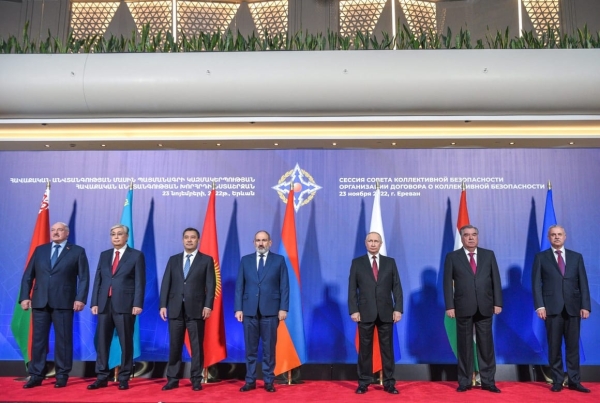EU raises bar for punishing countries that help Russia beat sanctions
Latest proposal sees targeting third countries for helping Russia beat sanctions as ‘exceptional, last resort measures.’
The EU is creating a new sanctions weapon, but is afraid to load it.
After adopting 10 sanctions packages following Russia’s attempted invasion of Ukraine, the EU is now designing a new mechanism to punish countries that enable sanctions evasion. If third countries, for example in Central Asia, fail to comply with Western sanctions against Moscow or can’t explain a sudden rise in trade in banned goods, they would face EU punishment.
The sanctions have so far been effective in curbing direct exports of sanctions from the EU to Russia, according to new research by a group of European experts, while the increase in imports from non-sanctioning countries has substituted no more than a quarter of missing volumes.
But there has been a spike in volumes of certain items previously sold to Russia being exported to neighboring or nearby countries like Turkey, Kazakhstan and Armenia. The evidence here points to the rerouting of popular consumer electronics like cell phones and computers — but microchips that might be of military use may also be slipping through the net.
One recent investigation has, meanwhile, found evidence that sensitive technologies — such as drones and microelectronics — have found their way to Russia through third countries like Kazakhstan with the help of local companies founded by Russian owners.
By putting a gun on the table, the EU hopes more countries will comply.
But that proposal is now being watered down, according to the latest version of the draft proposal, dated Wednesday and seen by POLITICO.
This comes after concerns expressed by several EU countries, including heavy-hitter Germany. They fear such a mechanism would hurt diplomatic relations, and even drive countries into the arms of Russia and China. Rather than hitting the countries that are allowing sanctioned goods to be re-exported to Russia, Berlin is proposing to focus on companies, according to an earlier discussion document dated May 5 and seen by POLITICO.
To win over the skeptics, the European Commission has included more safeguards.
The most recent version of the sanctions proposal sets out a more careful and step-by-step approach before targeting third countries. For example, it classifies such steps as “exceptional, last resort measures.” And, as a latest change to the draft, the Commission would have to demonstrate that “alternative measures taken have been ineffective” before punishing third countries.
This is the second time the Commission has been introducing extra safeguards in the proposal to accommodate countries’ concerns, even though sanctions experts have warned that the threat of the instrument has to be credible enough in order for it to work.
The anti-circumvention ban is not the only outstanding issue. Greece and Hungary are still holding out over Ukraine listing some of their companies as “war sponsors.” Athens and Budapest want some of their companies struck off this list before they will agree to the sanctions package.
EU countries now hope to get a deal on the package done next week, three EU diplomats said. There will be consultations ahead of the next discussion by EU envoys on June 7. “An agreement is within reach,” said one of them, while adding that the exact timing is “still hard to predict.”
This story has been updated.






